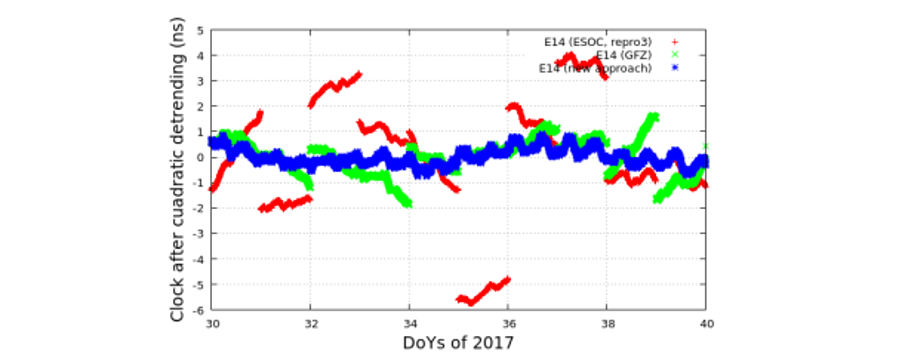
UPC clock estimation collection is now available!
The GREAT measurement of gravitational red shift allowed an improvement of a factor of 6 in a 40-year-old result of great relevance for general relativity. Now, a new data product of the project is available here from the GSSC: 1 year of continuous clock data using a new algorithm developed by gAGE/UPC under a contract funded by ESA’s Navigation Science Office. It is believed this new data may allow further better statistical characterizations of the gravitational redshift.
Having cracked the problem and achieved such a remarkable result with the original GREAT measurement (one week of data available here, the full dataset upon request), also allowed the scientists involved to understand how this estimation could be further improved. One of the constraints of the GREAT previous data were the small discontinuities introduced in the clock data every 24 hours by the processing algorithms
With this new work by gAGE/UPC, this problem has now been overcome. Long-term satellite clock series of about one year, from January 2nd to December 16th of 2017, have been estimated for all GPS and Galileo satellites, including the two eccentric Galileo satellites. Some of the main characteristics of this new approach are 1) the use of unambiguous carrier phases, 2) processing several constellations and several frequencies and 3) considering the temperature dependency of the phase biases.

Our results (see Figure 1) show the removal of clock data day-boundary discontinuities, which we believe may benefit the statistical characterization of long-term phenomena correlated with the on-board clocks, such as the measurement of the Gravitational redshift with Galileo eccentric satellites.
Reference:
[1] “Removing day-boundary discontinuities on GNSS clock estimates: methodology and results”, Adria Rovira‑Garcia, Jose Miguel Juan, Jaume Sanz, Guillermo Gonzalez‑Casado, Javier Ventura‑Traveset, Luigi Cacciapuoti and Erik Schoenemann. Journal on GPS Solutions, January 2021. https://link.springer.com/article/10.1007/s10291-021-01085-3


